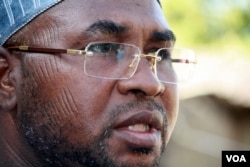Most Nigerians who suffer mental health problems never seek or are offered help. As doctors work to convince the public mental health problems can and should be treated, patients at one facility in northern Nigeria say they are among the lucky ones. Half prison, half hospital, young men and women are treated for addictions and other mental maladies with hard work, counseling and prayer.
Patients at this facility refer to themselves as ‘inmates’ and wear maroon scrubs as uniforms and handcuffs on their feet to keep them from running away. They were committed by their parents or guardians, who also have the authority to set them free.
Abraham Mohammad has been living here for almost a year and says he feels he has finally kicked a years-long addiction to cough syrup.
“When you are here for like a year you get full treatment, counseling, etc. etc. You will be able to be strengthened fully. Even in yourself you consider yourself now, tell yourself what you are supposed to do in the physical world,” he said.
Learning skills
Young men learn welding, sales and how to build everything from pots to sofas.
Young women learn to sew and make baby clothes. The center offers long-distance learning classes and stalls where patients can sell what they make on the streets.
Lawal Muduru, who heads the center, says patients are treated by psychologists and traditional doctors and counseled by pastors and imams. The hardest thing about keeping the center running, he says, is making enough money to feed the patients.
He says most parents pay $50 a month for their child's care, but many patients are abandoned by their families and remain at the center, spreading funds thin.
Overcoming stigma
Doctors say Muduru’s patients are among the minority of people getting any kind of mental health care in Nigeria, largely due to stigma associated with mental disease.
“When people have diarrhea they are not isolated. They do not suffer stigma. But when they have diarrhea of words, of vocabulary, you want to isolate them. That is when the stigma comes on,” explains Moses Ilo, a neuro-psychiatrist at the Wellington Clinic in Abuja.
He says partially because of stigma, most psychological programs in Nigeria are woefully under-funded.
And while the treatment may appear unconventional here, patients say even the chains on their ankles are meant to help.
"It is not just to molest or maltreat or anything. It is for you to know that ‘Wow, freedom is this light for which many men died in darkness, said Mohammad. "Okay what if I am able to have this freedom again. What will I do with it?’”
Other patients say they also appreciate the skills they are learning at the center, but like Mohammad, what they want most is to get better and remove the chains.














